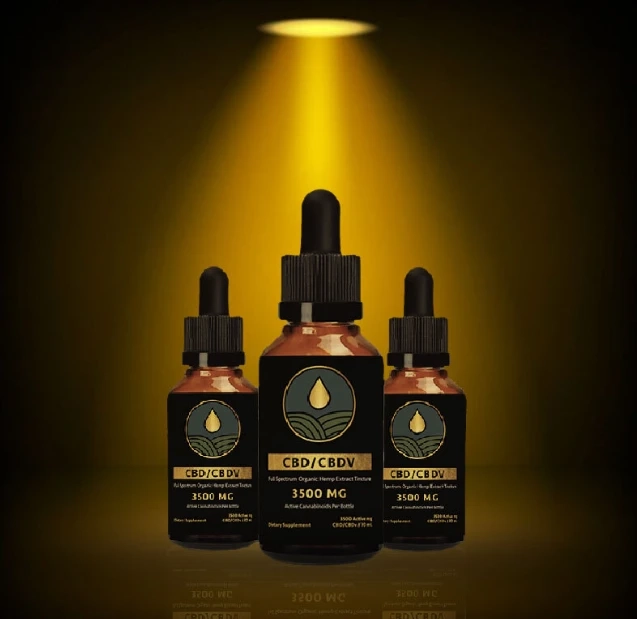CBDV Tincture, also known as cannabidivarin, is one of several compounds originating from cannabis and hemp plants. These compounds, known as cannabinoids, are partly responsible for cannabis's numerous impacts and therapeutic benefits.
CBDV shares structural similarities with CBD (cannabidiol). CBDV Tincture, like CBD, is not psychoactive when isolated, and so does not provide the euphoric high associated with high-THC cannabis.
CBDV has been detected mostly in C. indica landrace strains imported from Asia and Africa, as well as cultivars inherently lower in THC. CBDV Tincturelevels are often higher in strains that are strong in CBD.
CBD Full Spectrum Tincture Potential Medical Benefits
Much of the CBD Full Spectrum Tincture research has focused on its influence on seizures.Which produced the first FDA-approved CBD medicine, Epidiolex, is currently working on GPW42006, a CBDV-based drug to lessen or prevent epileptic and other types of seizures.
Their findings indicate that CBDV Tincture impacts the neurochemical pathway of capsaicin receptors, which is involved in both the start and progression of numerous kinds of epilepsy. CBD Full Spectrum Tincture has been demonstrated to be anti-epileptic "across a spectrum of in vitro and in vivo types of epilepsy.
CBDV is also showing promise in a number of other medical fields:
CBDV has shown potential in treating the neurobehavioral difficulties linked with Rett syndrome, according to a 2018 mouse study. An X chromosomal mutation causes Rett syndrome, which affects girls and causes seizures, speech problems, and muscle rigidity. CBDV appears to benefit both genetically determined and chemically generated versions of this and comparable disorders.
CBDV was discovered to repair memory deficits in mice with the same genetic abnormality as persons with Rett syndrome in a 2019 animal study published in the Journal of Psychopharmacology. CBD Full Spectrum Tincture also helped with neurological issues, but the results were very temporary.
CBDV was discovered to potentially aid patients with Duchenne muscular dystrophy in a similar 2019 study published in the British Journal of Pharmacology (DMD). Chronic inflammation and permanent skeletal muscle injury and degeneration characterise this condition. CBDV has the potential to decrease inflammation while also restoring and potentially improving muscular function. CBDV also improved mobility, indicating that the molecule has the potential to be a therapeutic therapy for DMD.
Childhood intractable epilepsy and autism spectrum disorder (ASD) frequently coexist. CBDV is being studied as a possible treatment for some of the more serious ASD symptoms, such as repeated behavioural issues, cognitive difficulty, and communication and social functioning deficits.
CBD Full Spectrum Tincture may possibly have anti-nausea properties. CBDV appears to function as an agonist to the CB1 receptors in rodents, hence inhibiting the nausea response.
CBD may aid in sleep.
Cannabidiol, or CBD, is one of the most important cannabinoids found in the cannabis plant. Cannabinoids work with your endocannabinoid system to keep your body in a condition of balance and stability, known as homeostasis.
CBDV Tincture, unlike tetrahydrocannabinol (THC), is not psychoactive, which means it will not get you "high." Instead, it has a variety of medical applications, including seizure reduction in persons with epilepsy and pain treatment from a variety of diseases.
Some science and anecdotal data show that CBD can also help you sleep better. Here's all you need to know about CBD for sleep.
What the science on CBD and sleep suggests
To determine whether CBD can enhance sleep, we must first determine what causes poor sleep.
Many factors can contribute to poor sleep. Insomnia can be caused by: mental health conditions such as anxiety, post-traumatic stress disorder (PTSD), and depression drugs, which can disrupt your sleep, according to the Mayo Clinic. -physical conditions associated with the sleep-wake cycle, such as chronic pain and restless leg syndrome
Caffeine, particularly when used late in the day, can be affected by ambient conditions like loud noises or an uncomfortable bed.
If your insomnia is caused by outside forces or diseases, CBD may help by treating the underlying reasons of sleeplessness.
While CBDV Tincture research is still in its early stages, some evidence suggests that CBD can be used to alleviate anxiety.
Trusted Source research published in 2019 investigated whether CBD may help sleep and/or lessen anxiety. The study included 72 participants, 47 of whom were anxious and 25 of whom were sleep deprived. Each day, the subjects were administered 25 milligrammes (mg) of CBD in capsule form. In the first month, 79.2 percent of patients reported less anxiety and 66.7 percent reported improved sleep.
CBD can also aid with pain, which can create sleep issues. According to a 2018 review Trusted Source in Frontiers in Pharmacology, there is a reasonable quantity of data to support the claim that CBD relieves pain. CBD, according to the scientists, can help sleep by lowering chronic discomfort.
According to other studies, CBD has an effect on the sleep cycle. Four people with Parkinson's disease were studied in a 2014 Trusted Source study. It discovered that CBD alleviated the symptoms of REM sleep behaviour disorder (RBD), a disorder in which people act out their dreams. RBD is linked to insomnia and nightmares.
A 2017 review also stated that CBD may be beneficial in the treatment of RBD and that it has the potential to alleviate excessive daytime drowsiness.
CBD may also have an effect on grogginess, which is another sign of sleeplessness.
0


